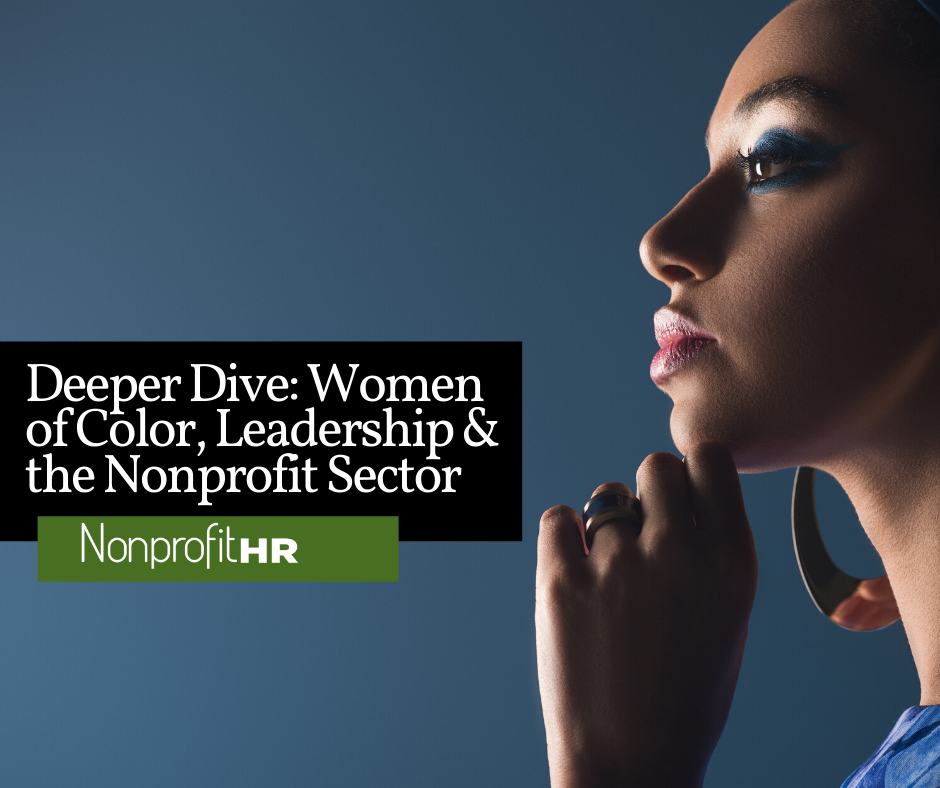WTOP: 5 ways nonprofits can…
In light of Women’s History Month, we’d like to recognize a few amazing nonprofit leaders that we admire.
But before we do that, we need to put a few things on the table. As much as we’re delighted to pay tribute to these dynamic nonprofit leaders who are at the forefront of social causes, we remain deeply concerned about the gender inequity that continues to live in and across the nonprofit sector.
Women – despite dominating the nonprofit workforce – still make up less than a third of social sector CEOs. And of those who are in the top-spot in their organizations they continue earn 25% less than their male counterparts. Millennial women nonprofit leaders are faring slightly better, earning 83 cents on the dollar to their Millennial male counterparts, but Xer and Baby Boomer women leaders continue to lag behind their male colleagues. Come on, really? It’s 2017.
Despite the fact that inequity lives on and women, even in our more enlightened social sector, continue to struggle with gender inequality, many continue to innovate, lead and make social change brilliantly.
We want to recognize a few nonprofit leaders who do just that:
Teresa Shook, Tamika Mallory, Linda Sarsour & Carmen Perez – Visionaries, Catalysts & Lead Organizers of Women’s March on Washington
So, a retired attorney, gun-control activist and two nonprofit leaders walk into a bar. Just kidding. That would probably make for a really bad joke.
What was absolutely not a joke was what these four women, and about 5 million more of their closest friends, pulled off in January on the day after the Presidential inauguration. This diverse, daring, dynamic group of women leaders won our total admiration and respect for their undeniable show of leadership with a purpose. The show of grassroots power that they inspired among women and men, young and old, black and white, rich and poor, was nothing short of breathtaking. Not only did these women organize in solidarity, but they also moved millions here and abroad to do the same.
We applaud each of them for their courage, leadership and determination to make their voices, and the voices of millions of other Americans, heard. Special kudos goes to Teresa Shook who, like many leaders before her, used the power of one voice to galvanize many! Mad respect for you, Teresa!
LaDonna Brave Bull Allard & Kandi Mossett – Standing Rock Leaders/Activists
The Dakota Access Pipeline protests, also known by the hashtag #NoDAPL, was a grassroots movement that began in early 2016 in reaction to the approved construction of the Dakota Access Pipeline. Although the camp at Standing Rock has now been bulldozed away, the women leaders at the helm of this movement are anything but flattened.
Founder and Director Ladonna Brave Bull Allard of Sacred Stone Camp and Head of Indigenous Rising Kandi Mossett continue to stand by their movements to protect communities from environmental injustices. Both women are descendants of America’s earliest refugees and epitomize bravery and unquestionable leadership in their fight to preserve historic, sacred land running through parts of South and North Dakota and beyond. We applaud you for your unquestionable commitment to justice, LaDonna and Kandi.
Beverly Bond – Founder & Executive Director, Black Girls Rock
Let’s be honest, the narrative on young Black women is fraught with so many misunderstandings and mistruths – or shall we say “alternative facts.”
For more than 10 years, Beverly Bond, social innovator, former model and founder of Black Girls Rock, has sat at the helm of an amazing, girl-focused organization whose sole mission has been to enrich “girls through leadership, education and positive identity development.”
Even before it was in vogue to tout the beauty and tenacity of young women of color, Beverly was moving and shaking things up in her community to shift the cultural paradigms of media/music messaging that often negatively impact women and girls — and Black girls in particular. We salute Beverly for her leadership, and for the countless acts of inspiration and power she has instilled in the lives of young, Black women across America and beyond.
Brandee McHale, President, Citi Foundation
One of the most powerful positions in the nonprofit sector is that of a foundation president. Brandee McHale who is an advocate for youth empowerment and poverty alleviation, runs one of the nation’s largest and most powerful corporate foundations, Citi Foundation. She is a shining example of a nonprofit leader who proves that women have power and can make an impact in a man’s world.
Responsible for leading decisions about how the Citi Corporation invests in social causes, Brandee has been at the foundation’s largest single commitment in its 20-year history. The $50-million initiative works with community partners to unlock economic opportunity for hundreds of thousands of low-income youth in 10 U.S. cities.
We admire Brandee’s leadership for how she has bridged the corporate and social sectors in such a powerful way.
Christine Owens, Executive Director – National Employment Law Project
Under Christine’s leadership, her organization, National Employment Law Project (NELP), has fought to ensure that all American workers can realize opportunity and economic security through work.
The fight for fair wages has never been stronger than it is now. With a deep background in public policy and as a champion for advancing employment rights and opportunities for women, people of color and low wage workers, Christine has personified determination, commitment and passion for a cause that’s near and dear to our hearts – workplace equity, living wages and the right of all Americans to economic and social justice.
Kudos to you, Christine for your commitment to serving those whose voices are often among the least heard.
Despite the persistence of gender imbalance and inequality, women remain critical to the nonprofit sector workforce. They show tremendous strength in balancing mission and business and are passionately achieving measurable impact for the communities they serve.
We believe that all organizations — social, private and public — should work to achieve absolute gender equality at all levels and in all respects. By recognizing the nonprofit leaders at the helm of organizations and movements like these, we remain inspired to do shine a light on the amazing women that are leading social change brilliantly.





























